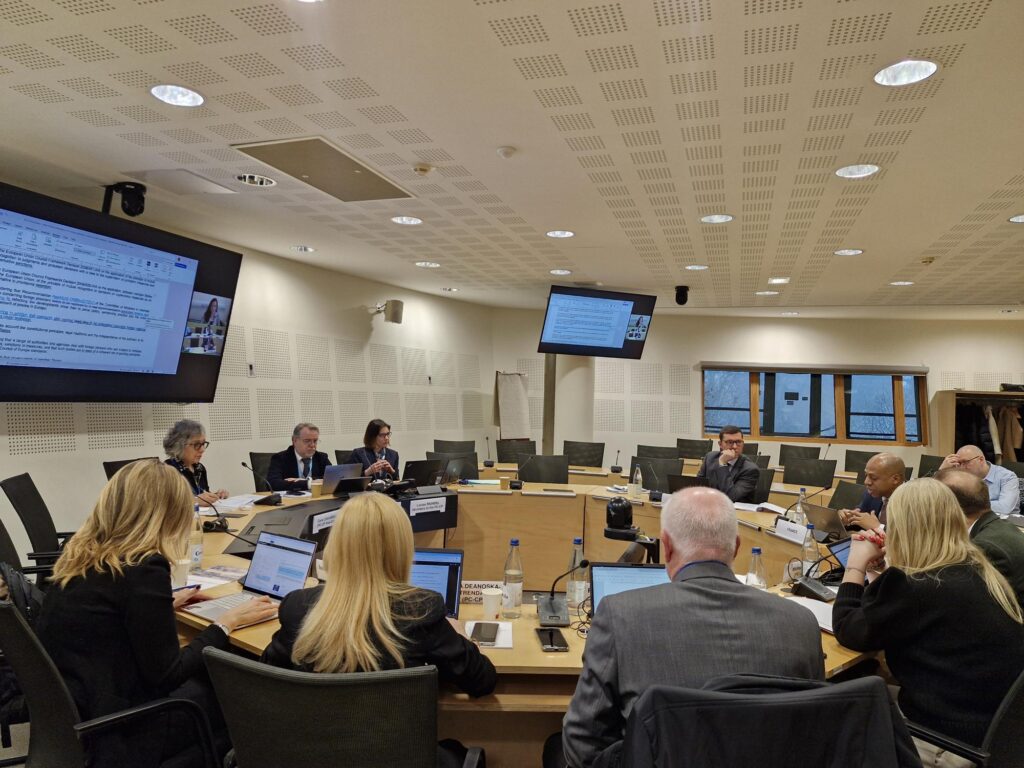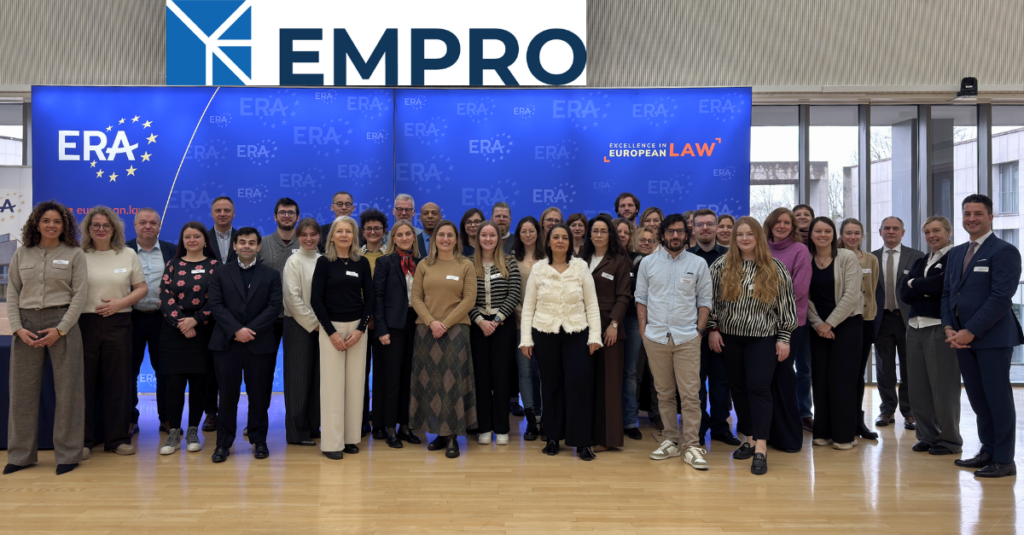Previous Article
News
Countering radicalisation from an European perspective
Combatting radicalisation has become a high priority topic in the field of criminal justice. Jesca Beneder, legal officer at the European Commission, DG Justice and Consumers shares her view on the role of European prisons and probation in preventing radicalisation and violent extremism.
Which are the plans and priorities of the Commission to counter the risk of radicalisation in prisons?
To explore options for dealing with the issue of radicalisation in prisons, we organised a High-Level Conference on the criminal justice response to radicalisation in October 2015, where we gathered 16 Ministers of Justice and 350 participants. The results of this Conference fed into Conclusions adopted by all EU Member States on 20 November 2015 which should now be implemented at national level.
The Council Conclusions contain concrete actions such as the setting up of de-radicalisation, disengagement and rehabilitation programmes to be used in prisons and by judges and prosecutors, develop risk assessment tools to give suitable criminal justice responses for each radicalised individual, including in the juvenile justice systems, and to train professionals.
To support Member States in putting in practice these actions, DG Justice made more than €8 million available in 2015 and 2016. We have just launched the 2016 call which can now be consulted on our website.
We very much encourage Member States and organisations with expertise in the fields of prisons and probation, such as the partner organisations of CEP, to apply for funding.
In cooperation with the European Judicial Training Network (‘EJTN’), we are also facilitating training for prison and probation staff on issues such as detection of radicalised offenders, assessing the dangerousness of radicalised persons correctly and developing knowledge of de-radicalisation programmes. On 20 May 2016, we organised a conference for representatives of various national bodies on the existing training programmes in Member States and to evaluate the need for additional training.
How does the Commission deal with the many ongoing initiatives in this field?
There are indeed quite a few initiatives in this field from various European bodies.
At EU level, the Radicalisation Awareness Network (RAN) and its Prison & Probation Working Group has been active since 2011 in exchanging ideas between front-line practitioners. In October 2015, this group adopted a Working paper on dealing with radicalisation in a prison and probation context.
In June the Commission has published a communication setting out how work at EU level can support Member States in specific areas such as supporting research, countering terrorist propaganda and hate speech online, promoting inclusive education and addressing radicalisation in prisons (Communication from the Commission supporting the prevention of radicalisation leading to violent extremism of 14 June 2016)
On 2 March 2016, the Council of Europe issued a set of Guidelines to prevent the radicalisation of prisoners and people under probation and is now working on a Handbook for prison staff.
At international level, the Global Counter Terrorism Forum (GCTF) and the United Nations have been working on the issue of prison radicalisation for many years.
I think it is important to achieve synergies between the different actors involved and not to duplicate efforts.
It has also been reiterated repeatedly by these international bodies that poor conditions in prisons, including overcrowding and long periods of time in pre-trial detention, staff shortages, tension between prisoners and staff and disproportionate disciplinary measures have a negative impact on the timely identification of signs of radicalisation and make the successful implementation of rehabilitation programmes very difficult.
An approach to preventing radicalisation which focuses on security alone may, therefore, not be sufficient. Rather, countering radicalisation in prison should be part of overall reform programmes that include improving prison infrastructure and efficient and comprehensive rehabilitation programmes for prisoners. These matters cannot be tackled overnight and will require a long term commitment from EU countries.
The Commission will provide full support for national efforts in this area. We are currently exploring funding for the modernisation of prisons under the existing EU Funds such as the European Social Fund and the European Regional Development Fund.
We will also try to achieve synergies by enhancing our cooperation with the Council of Europe. Indeed, in 2016, we will start a project facilitating the exchange of best practices between national bodies monitoring detention conditions in the Member States and the European Committee for the prevention of torture and inhuman and degrading treatment (CPT) through the creation of EU national preventive mechanisms (‘NPM’) network. This network will bring together the NPMs (often being national Ombudsman) This contributes to the strengthening of the role of controllers of prisons in the EU and could pave the way to a more structured exchange of practices and dialogue between the Member States in the area of detention.
Besides the EU NPM network, we are providing funding to the collection of prison statistics, the SPACE I and II report which is currently managed by the Council of Europe. Our cooperation with the Council of Europe would allow producing a much more elaborate report, including data of particular interest to the EU, such as the number of prisoners jailed for crimes linked with terrorism, the number of transfers of prison and alternative sentences between EU Member States, etc.
What is the role of probation and are there any particular issues CEP should focus on?
Judges and prosecutors are increasingly involved in finding an adequate response to the phenomenon of foreign fighters. The dynamics with which they are confronted may differ from those in ordinary criminal cases and balancing public safety with integration is key.
Returnees are a heterogeneous category: they may be dangerous, traumatised, in need of mental support, or disillusioned and ready for reintegration. Failure to identify those who might, with assistance, be able to return to a ‘normal life’ could lead to their further radicalisation. There is also an increasing number of young people, children and women involved in terrorist offences.
More prosecutions for these offences will inevitably mean more prison sentences and this poses additional challenges as prisons are often referred to as breeding grounds for radicalisation, an environment in which juveniles and first time offenders especially may be particularly vulnerable to indoctrination and recruitment by extremist groups.
Judges and prosecutors question whether it would be the right decision to imprison all individuals coming back from conflict zones in the pre-trial stage when they should still be presumed innocent. Sometimes prosecution might not be feasible because of the limited evidence on their activities in the conflict zone.
Faced with this dilemma, judges and prosecutors may have to re-assess what are appropriate punishments for such crimes and whether alternative sanctions are possible and desirable in order to reduce recidivism and prevent further radicalisation.
You see, therefore, that there is an increasing need for practitioners to discuss these issues at international level in order to learn from each other. The GCTF is working on recommendations on the effective use of alternatives to detention and prosecution in terrorism related cases. Eurojust gathers, through its tactical meetings on terrorism and the Terrorism Conviction Monitor, information on national judgements in the field of terrorism, including alternatives to imprisonment.
If indeed these discussions would lead to an increased use of alternatives in the pre-trial and post-trial stage, such as a release under condition to follow a de-radicalisation, disengagement and rehabilitation programme, this would imply an enhanced role for probation services to monitor the correct implementation of these conditions.
For this, appropriate probation structures would be needed as well as special training for probation staff. It is important for probation staff to identify the risk of radicalisation at a very early stage – not necessarily only for those who have not been involved in terrorist activities, but also for those who have been convicted for regular minor offences and might end up in prison with the risk of being further radicalised.
The role of probation officers in drafting pre-sentence reports to advise judges and prosecutors is also very important. Enhanced cooperation and information sharing between different actors, such as schools, social workers and the police, will thus be indispensable.
To ensure a smooth transition from prison back into society, close cooperation with prison services is required to continue rehabilitation efforts after release. The involvement of family and the community are also prerequisites for a successful implementation of a rehabilitation programme.
All these issues need to be further developed and fine-tined over the coming years.
So you see, there are many challenges ahead, including for the probation sector. The Commission, in close cooperation with CEP, will support Member States by providing a platform to exchange best practices and by making funds available to make all the objectives a reality on the ground.
Jesca Beneder, European Commission, DG Justice and Consumers, Criminal Procedural Law
The opinions expressed in this article are the contributors’ own and do not necessarily reflect the views of the European Commission

Related News
Keep up to date with the latest developments, stories, and updates on probation from across Europe and beyond. Find relevant news and insights shaping the field today.

CEP Board
Interview with new CEP board member Jana Bewersdorff
19/02/2026
During the General Assembly in Austria, a new CEP Board got elected for the upcoming three years. In the coming weeks we will publish interviews with all newly-elected board members where they will share information on their professional background, how they would like to contribute, what challenges lie ahead and many more.
Enjoy reading!
Recap

Research
Recap: Expert group on Research
18/02/2026
The Expert Group on Research met on 17 February at the CEP office in Utrecht, The Netherlands, for its annual face‑to‑face meeting.
New

CEP members
New CEP member: Killian Evert
17/02/2026
In recent weeks, CEP has interviewed individual members and representatives of the new member organisations that joined CEP at the beginning of 2026. In these interviews, the new member organisations or individual members will share information on why they decided to become members, how they would like to contribute to the development of CEP and many more.
Enjoy reading!
New

CEP Board
Interview with new CEP board member Line Elisabeth Wilberg
11/02/2026
During the General Assembly in Austria, a new CEP Board got elected for the upcoming three years. In the coming weeks we will publish interviews with all newly-elected board members where they will share information on their professional background, how they would like to contribute, what challenges lie ahead and many more.
Enjoy reading!
New

Probation in Europe
CEP at 40th PC-CP Working Group Meeting
09/02/2026
CEP actively participated in the meeting of the Council of Penological Co-operation (PC-CP) of the Council of Europe. Through its involvement, the organisation contributes meaningfully to the work of the PC-CP by representing the voices and professional experience of probation practitioners across member countries and jurisdictions. CEP Vice-President Ms Danijela Mrhar Prelić is a member of the PC-CP Working Group and actively participates in all meetings.
New

Probation in Europe
CEP at the EMPRO Symposium hosted by ERA
04/02/2026
CEP actively contributed to the EMPRO Knowledge Exchange Symposium hosted by the Academy of European Law (ERA) in Trier on 28–29 January, bringing together practitioners, policymakers, and researchers to reflect on the implementation of EU Framework Decisions in probation and supervision.
Subscribe to our bi-monthly email newsletter!
"*" indicates required fields
- Keep up to date with important probation developments and insights.

